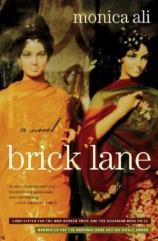Brick Lane
Review
Brick Lane
You know you are dealing with an acclaimed book when the critical praise blurbs run to four pages at the beginning of the novel. Monica Ali's BRICK LANE made it to no fewer than ten "Best of 2003" lists, including a nod from the editors of the New York Times Book Review. It won the 2003 Discover Award for Fiction and was shortlisted for the Man Booker Prize. All of which makes it slightly intimidating to review. What if the emperor has no clothes?
Luckily for me and the rest of the book buying public, the emperor is not only wearing clothes, it's an all-Prada outfit, complete with a pair of Manolo Blahnik stilettos.
At the novel's outset, however, the protagonist, Nazneen, is about as far from Prada and Manolo Blahnik has one could get. BRICK LANE begins with her birth in what was at the time East Pakistan, soon-to-be reborn as Bangladesh. Born into a small Muslim village, a premature baby who wouldn't eat, Nazneen was Left To Her Fate. Frequent retellings of the story dictated the capitalizations; her Amma (mother) refused to take her to the hospital, leaving Nazneen's life in God's hands.
Nazneen's fate becomes the central spoke of the novel as her parents arrange a marriage to a much older Bangladeshi man and pack her off, sight unseen, to London. Her husband, Chanu, who sees Nazneen as an "unspoilt girl from the village," is himself a mass of tics and insecurities, as full of puff and blather as he is devoid of social graces. The walls of his flat are covered with his framed certificates of achievement. "This one is from the Centre for Meditation and Healing ... Here's one from the Writer's Bureau ... This is not actually a certificate ... it's just directions to the school, but that's all they gave out." As is seemly in her culture, Nazneen submits herself silently to his theories and his many needs, including using a razor to slice the corns away from his toes. Not surprisingly Nazneen spends time forcing herself to accept this new way of life. "Every particle of skin on her body prickled with something more physical than loathing. It was the same feeling she had when she used to swim in the pond and came up with a leech stuck to her leg or her stomach."
As time passes and the two weather various crises, Nazneen learns to view Chanu with a bit more acceptance. They have two daughters, one of whom (Shanana) battles constantly with Chanu, mainly over her assimilation into British culture. The other daughter, Bibi, craves stability and acceptance. "It was like walking through a field of snakes. Nazneen was worried at every step ... It was up to her to balance the competing needs, to soothe here and urge there, and push the day along to its close ... It took all her energy. It took away longing." Adding to Nazneen's worries is the fact that her sister Hasina still lives in Bangladesh, and Hasina's letters present a life even harder than Nazneen's.
In an attempt to earn a little money, Nazneen agrees to take in some sewing projects, turning out garments in a sweatshop-like arrangement. Her projects are arranged by a young man, Karim, with whom Nazneen launches into a torrid love affair. She moves outside her passivity and forgets her fate. "It was as if the conflagration of her bouts with Karim had cast a special light on everything, a dawn light after a life lived in twilight. It was as if she had been born deficient and only now been gifted the missing sense."
Living in a post-9/11 world fills Chanu with conflict. He worries simultaneously that his daughters are becoming too English and too Muslim. His solution? Move back to Bangladesh. But can Nazneen accept this as her fate?
Ali's characters are a study in subtlety. It is to her credit that she can create such a vivid world with someone who rarely even speaks as its centerpiece. It is a tight, compact story that adds a new dimension to the immigrant experience, evoking the line they all walk between two cultures, between fate and responsibility, between duty and freedom. Nazneen, above all, understands this.
"Bibi always asked for stories. She wanted the words because the words stitched her mother close."
"Tell us the one about How You Were Left To Your Fate."
"Not that one," groaned Shahana. "It's boring."
"True," said Nazneen. "I'll tell you a better one."
Reviewed by Shannon Bloomstran on December 23, 2010
Brick Lane
- Publication Date: May 25, 2004
- Genres: Fiction
- Paperback: 432 pages
- Publisher: Scribner
- ISBN-10: 0743243315
- ISBN-13: 9780743243315





